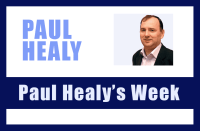‘He electrified our youth’ – Paul Healy on…The Greatest Friday and every day since
It’s difficult to adequately describe the scale of the impact he had on us.
He electrified our youth.
Imagine if you could only see Messi or Ronaldo perhaps twice a year – and then only in the middle of the night and with no repeat viewing – well, it was like that, only multiple times worse.
Back in the early 1970s, the world heavyweight boxing scene was on a sporting scale all of its own.
We had the GAA, the soccer across the water, the rugby (the ‘four nations’ in those days), not to mention the fairly farcical but bizarrely appealing wrestling on ITV’s ‘World of Sport’ every Saturday!
Every four years there was the Olympics – magical in those innocent times – and the World Cup, the latter almost always a thrilling, joyous extravaganza, none more so in that era than the ticker tape-wrapped magic of Argentina ’78.
But nothing, absolutely nothing, compared to the epic world heavyweight boxing nights of the early 1970s.
And one man held the watching world spellbound.
We either rose at 2 or 3 am, or else we tried the deceptively difficult task of not going to bed at all, instead fighting sleep in anticipation of the incredible entertainment and drama that the early hours promised.
Usually we stayed up, confident that we’d be sharp and fresh once the countdown began in Madison Square Garden or Caesars Palace.
More often than not this proved very challenging, and I can recall my desperate attempts to keep my eyes open during the usually obscure film that RTÉ would drag out of some dusty vault in order to command its audience’s attention while everyone got ‘ready to rumble.’
Occasionally we succumbed to the fatigue and even missed some of the action, but there was usually a parent or sibling generous enough to bring us back to the main event.
And what a main event it always was. There was the formidable Ken Norton. The dynamic Floyd Patterson. The magnificent, unforgettable, almost animalistic Joe Frazier. The terrifying George Foreman.
And then there was that man. The man who held the watching world spellbound.
I first became aware of Muhammad Ali in the early 1970s. Subsequently, I learnt all about his extraordinary emergence a decade earlier. Olympic gold. Throwing his medal into a river. The brash talk, the baiting of Sonny Liston. Then the first fight against Liston, the underdog’s amazing win. Muhammad Ali was known as Cassius Clay then. Boxing had never seen anything like it. With Liston on the canvas, Clay’s words to a ringside reporter were like a compelling, original music intro to the rest of his life.
‘I shook up the world! I shook up the world!’
In Rooskey, growing up with the regular brawls outside the Cloudland Ballroom in that era, we weren’t used to such precision boxing and such peerless charisma.
It wasn’t just Rooskey that was spellbound by Ali. He shook up the world. His speed and his skill, not to mention his extraordinary showmanship, made him the most remarkable fighter in history.
He regularly taunted his opponents during the fight, asking if that was the best they could do, telling them they were ugly…in one instance calling in mock desperation for a contender….
“No contest, get me a contender!” Ali proclaimed to a stunned ringside audience. His opponent that night? The great Floyd Patterson!
As has been well documented in recent days, since his era-ending and much-lamented death, Ali became much more than a genius in the ring; he became a civil rights campaigner, a political, cultural and religious force…the most famous person on the planet, and one of profound influence.
I have concentrated on Ali the boxing phenomenon. That’s how we discovered him. His wit and charisma outside the ring just embellished his daring, audacity and brilliance in it.
Unforgettable. The Greatest.
Ali will, in reality, live forever.




